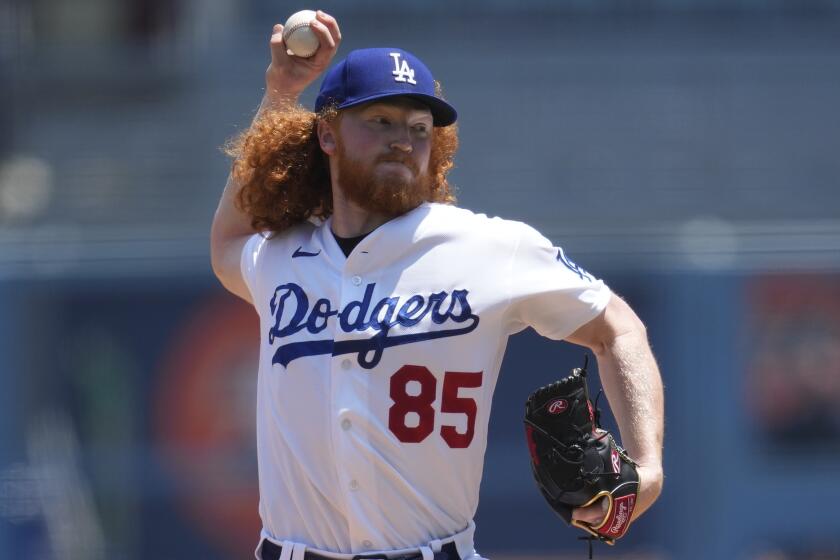Priced to Move?
It is mid-May, not even summer yet in a season that stretches into fall.
Too soon to fit Adrian Beltre for a Triple Crown?
Too early to conclude that he has turned the corner, that expectation has become reality?
Who knows how it will play out, but this much seems certain: Dodger fans should be capturing Beltreâs ongoing evolution on the camera of their mind for a very good reason.
Which basically is this: They may not have the opportunity beyond 2004 -- and isnât that ironic?
By finally excelling instead of exasperating, the third baseman may be pricing himself out of Frank McCourtâs highly leveraged operation.
Itâs this simple:
At 25, an age at which premium players are seldom eligible for the free-agent market, Beltre is certain to test it in November.
By sustaining his current form, he also is certain to seek a multiyear contract that would not seem to fit McCourtâs speculated intent to lower his $105-million payroll to $80 million.
If he is unable to sustain his current form, Beltreâs future in Los Angeles is similarly tenuous. The Dodgers would be unlikely to invest another $5 million in a failing process.
So, Beltre is gone either way?
Well, the Dodgersâ interest in signing the available Aaron Boone as third base insurance is a solid indication, as a person familiar with the clubâs thinking said, that they donât want to get boxed in by the Beltre uncertainty.
Boone is strictly a starting player. He might be willing to play second base for the remainder of the season once he has recovered in August from the left-knee injury that resulted in his release by the New York Yankees, but the belief is that he would want to play third base next year.
Amid a potentially combustible situation, Dodger General Manager Paul DePodesta is naturally cautious.
âAaron Boone is a very nice player,â he said. âThere are a lot of teams he could help. At this point heâs still recovering from a serious injury. Nothing can be gained by saying anything more.â
Said a similarly cautious Beltre, reflecting on his contract situation:
âI donât like to think about it. If I am going to stay here or not
âWe have to see what theyâre going to do. Itâs something I canât think about now. All I can think about now is trying to do my best, keep doing what Iâm doing and trying to get into the playoffs. The fans need that because we havenât been there for a while.â
Fans and others have never quite known what to make of Beltre -- is he the torrid hitter of the last two second halves or the frustrating slugger of too little plate discipline and too many strikeouts?
A guy whose inconsistency exasperated some recent club officials to the extent they would just as soon have given him away despite his obvious potential.
Of course, what has tended to be forgotten in all of the Beltre debates is how he was fast-tracked through double A, skipped triple A, found himself in the new culture of Los Angeles at 19 and set an early standard by batting .290 in 2000 with 20 home runs and 85 runs batted in.
Could a kid almost straight from the Dominican Republic be blamed for thinking it would be easy, that his talent would take care of everything?
Could the league be faulted for sizing him up, finding his holes and making adjustments?
Wouldnât agent Scott Boras have to sit with him in his car in the Dodger Stadium parking lot for several hours after a midseason game in 2002 talking about focus and discipline?
Amid all of that, there also was the distracting legal and contract battle over his correct age, the debilitating ramifications from his appendectomy in the Dominican, the disconcerting trade rumors and the tantalizing potential.
Didnât Beltre hit 21 homers with 75 RBIs in 2002, 23 with 80 in 2003? Didnât he go into the 2004 season having hit more home runs than any major league player under 25 other than Albert Pujols?
âEveryone kept talking about how big of a disappointment he was, but he was still going 20 and 80, and I know a lot of teams that would have still taken that,â teammate Paul Lo Duca said in the context of where Beltre is now.
âHe was still only 22, 23, 24, and it was only a matter of time. People forget he didnât have that much time in the minor leagues, and he was still learning here. People donât understand how tough it is to learn at this level.â
Beltre is batting .385 with nine homers and 26 RBIs through 30 games. Clearly, a lot of things have come together, including the six years of hard lessons.
While Boras has preached repetition, new batting coach Tim Wallach has closed Beltreâs stance, encouraged him to use his power to the opposite field and worked on his mental approach.
âI always thought it was my mechanics that needed [to be] fixed, but it was my mental approach more than anything that was missing,â Beltre said. âI go to the plate with a lot more confidence now.â
In addition, wife Sandra and 3-month-old daughter Cassandra have created a balance that also had been missing.
âIâm a different man,â Beltre said. âMy life has changed with something Iâve never experienced before. The baby probably has helped me get to where I need to be. Even if I go 0 for 4, when I see her itâs totally different.â
What DePodesta says he sees is a young player who was force fed at the major league level and has now made the adjustments necessary to be successful.
âNot only is it worthwhile for Beltre to go to right field as often as he now does,â DePodesta said, âhe doesnât give up anything doing it.
âHe has so much more plate coverage and heâs so much more dangerous.â
Every hit, however, is accompanied by the cha-ching of a cash register. In many ways, Beltre is the first test of McCourtâs long-term intentions.
âWe just hope [Beltre] continues to have the type season heâs having,â DePodesta said. âIf his contract becomes an issue, itâs a problem weâd love to have.â
Certainly, the Dodgers arenât going to say anything different at this point of a promising season. DePodesta even said he is open to discussing an extension during the season, but thereâs little chance of that. Boras seldom allows a client to forfeit his market eligibility in his walk year, and no one from the Dodgers has approached him with an offer.
In fact, McCourt hasnât even introduced himself to the renowned agent even though they are often separated by only a few yards while watching games from the premium seats at Dodger Stadium, a curious development considering that Boras also represents Eric Gagne and Odalis Perez, and it would seem to be to McCourtâs benefit to establish a relationship.
Boras refused to discuss any of that. Nor would he get into a premature discussion regarding Beltreâs contract potential.
He made the point, however, that Beltreâs situation is difficult to compare to any other recently signed third baseman because few free agents come on the market with premium statistics of the type Beltre is producing at 25. The potentially attractive Troy Glaus of the Angels will be 28 when eligible for free agency in November, but most free agents, particularly third basemen, are 30 or older when they hit the market with experience and production comparable to that of Beltre.
âYou have to look at A-Rod,â Boras said, referring to the 10-year, $252-million signing of Alex Rodriguez, then 25, by the Texas Rangers in December 2000. Boras said he didnât mean that Beltre would qualify for a similar contract but that there are few 25-year-olds of that stature from which to draw comparisons.
âAdrianâs ceiling can only grow,â Boras said. âHeâll have another five years before heâs 30, and he would have a real advantage over other players in the market. In fact, players of that stature rarely get to free agency. Teams generally understand what they have and donât let it happen. In Beltreâs case, thereâs going to have to be a premium paid in years and dollars.â
Itâs too late to suggest the Dodgers should have recognized this a year ago.
At that point, the organization was split on whether he should even be retained, and his signing to a multiyear contract would have probably generated a barrage of media criticism.
Now?
Well, it seems doubtful that a financially retrenching organization would pay the premium.
The clock is probably ticking on Beltreâs future in Los Angeles, whether he goes on to turn the corner or not.
*
(BEGIN TEXT OF INFOBOX)
On the Upswing
Comparing Adrian Beltreâs numbers through 30 games this season and the previous two seasons:
*--* Category 2004 2003 2002 BATTING AVG. 385 213 312 RUNS 22 11 11 HITS 47 20 34 DOUBLES 8 8 6 HOME RUNS 9 4 2 RBIs 26 11 12 ON-BASE % 394 260 375 SLUGGING % 672 426 440
*--*
More to Read
Are you a true-blue fan?
Get our Dodgers Dugout newsletter for insights, news and much more.
You may occasionally receive promotional content from the Los Angeles Times.








